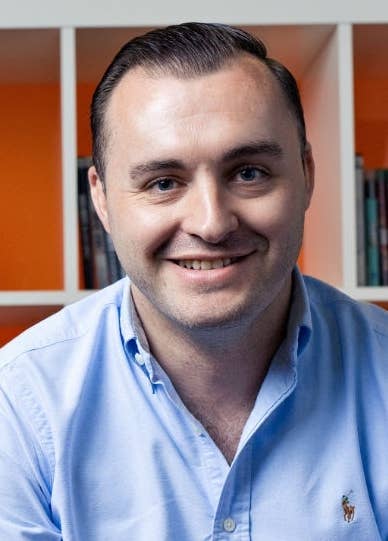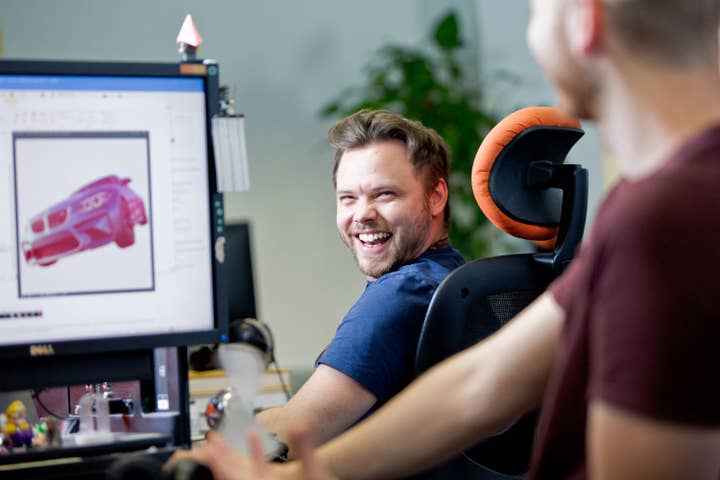How Playground is hiring top talent for its secret second project
Recruitment boss Nick Duncombe reflects on the challenges of securing world-class developers when you can't tell them what they'll be making
Playground Games has been quietly doubling its headcount over the past two years, after the success of Forza Horizon 3 enabled it to embark on a new (and highly secretive) project.
Last year, we revealed that the UK developer was opening a second studio with plans for a team of 200 developers to work on something that goes beyond the racing antics its first team is known for. Since then, precious little new information emerged, save for the fact that it is an "open-world action RPG".
Expanding your headcount by 200 is a tall order for any company, but Playground faces the added complication that - like many studios working on unannounced games - it can't actually tell candidates what they will be working on. We caught up with the studio's resource manager Nick Duncombe to find out how much this hinders his efforts to recruit the best available candidates.
"The top-line challenge is you can't talk about the project," he tells GamesIndustry.biz. "That's the obvious hurdle, but that's the priority from the start.

"The other difficulty you have is you're recruiting from the top down. The hardest hires to make within the industry are those senior positions, the leadership roles right down to director levels like chief, lead and senior. Hiring those first is a lot more challenging than hiring your mid to entry-level roles.
"Then you've got the volume. This project we're working on at the moment is 200-odd hires. That's intense, and in a market where candidates are already in short supply, it makes it even trickier."
Like most studios, Playground relies on no single source of new recruits, instead taking a multi-channel approach that encompasses advertising on jobs boards, promoting vacancies via social media and its own careers webpage, and networking by attending conferences and other games events - even university open days, Duncombe tells us. The firm also uses referral bonuses to encourage its team to join in the search.
"They're a really big thing for us," Duncombe says. "We pay £2,000 per referral and that generates a lot of interest both among staff and new starters in terms of securing people."
"The chance to work with that world-class talent is a real draw for people - even if that project isn't in the public domain"
Naturally, Playground also calls on the expertise of recruitment agencies, although the studio's use of this resource has dipped of late. When he joined in 2015, roughly half of all hires were handled directly, with the other half sorted by agencies. Last year, direct recruitment rose to 64 per cent of new hires, while so far in 2018 it has been 79 per cent.
But Duncombe recognises that Playground should use agencies more often, if only to take the pressure off the internal recruitment team. He also acknowledges that hiring for a secret project is just as challenging for these external experts.
"You've got to trust these teams," he notes. "They're representatives of Playground... but we don't disclose them on what the project is, so they're in the dark - other than the fact that it's an open RPG."
Duncombe acknowledges that Playground would "potentially" receive more interest in its vacancies if candidates had a better idea of what they were applying for, but adds that some of the hires the studio has already made are proving to be a draw in their own way.

Last year, we reported the studio had recruited developers from studios as prestigious as Kojima Productions, EA DICE, Rockstar North, and Ninja Theory. Since then, Duncombe tells us he's also been able to attract talent from BioWare, Rocksteady and Creative Assembly.
"The core team we've already hired... the chance to work with that world-class talent is a real draw for people - even if that project isn't in the public domain," he says.
"You can't talk about the project. That's the obvious hurdle, but it's a priority from the start"
"There are also certain benefits to joining a project like this at the early stage. You're part of the core team, you get to shape the project from the beginning. That's something you don't always get elsewhere in the industry."
It's also difficult to take that multi-channel approach to recruitment when the press is often scouring every publicly available resource for details of what you're working on. Countless projects have been outed - or at least heavily hinted at - by job listings that gave away that little bit too much, and were pounced upon by the ever hungry games media or even forums of avid gamers.
It's something Duncombe is always aware of when hiring for an unannounced title: "At most companies you end up with a standard role profile, but in terms of what's listed in [a specific vacancy] you've got a bit of a balancing act. You want to be able to pitch the role, and it has to be accurate as to what the role is. That's where our 'open-world action RPG' phrase comes from, that's our public pitch for the project."
Nonetheless, rumours inevitably spread across the industry. One of the best parts of the development community is how genuinely friendly people can be across studios, but it does mean details occasionally slip out during networking drinks or some other occasion. Even GamesIndustry.biz has heard rumours as to what Playground's second studio might be making - and surely this helps drive interest in working there.
"Rumour and speculation is part of the industry. The fact that people are talking about Playground, that's really helpful at the end of the day"
"Obviously, we don't comment on rumour and speculation but it's part of the industry," says Duncombe. "Gamers are so passionate, they're always striving to know things. The fact that people are talking about Playground, that's really helpful at the end of the day.
"Any sort of publicity is great for driving recruitment and solidifying the brand. We're already starting on a great foundation off the back of Forza Horizon 3, which had a 91 Metacritic score and massive commercial success. And a brand new AAA project, not in the genre we're known for, it does create that buzz."
So when are new recruits let in on the Big Secret? Studios like Playground must be careful about telling promising candidates too early, in case they withdraw their interest but take that knowledge elsewhere. Even so, some people are surprised that they are only told on their first day of work. But, Duncombe says, not knowing isn't always the dealbreaker you might think it is.

"Each candidate has different priorities in what they're looking for in a role, and in the studio they're going to be working for," he says. "For some people the project is the top priority, but for other people it's the challenge, the people they're working for, the working environment, or maybe the perks and benefits. It's on a case-by-case basis.
"Everyone signs an NDA. It's generally only leadership roles where we've disclosed, because they're leaving another world-class studio to come and join us"
He continues: "Everyone signs an NDA - that's a given. If they need to be disclosed it's generally only leadership roles, where we've disclosed because it's a big move for them. They're leaving another world-class studio to come and join us. Other than that, we don't generally disclose the project, and we haven't had a massive pushback against that - people aren't like, 'I need to know otherwise this isn't going anywhere'.
"But everyone [on the team] has been in the industry long enough. They understand the pressure of NDAs and the need for secrecy."
Playground is, of course, far from the only studio to have to deal with this particular personnel challenge. AAA developers, whether publisher-owned or independent, often have to bring in fresh talent for unannounced titles and maintain that level of secrecy, but even some indies and smaller studios occasionally get their hands on a closely guarded IP. We recently spoke to Essex-based indie Dlala Studios, which had to more than double is headcount for a Disney title that was ultimately scrapped - and two years on, it still can't say what the project was.
"The proposition has to be the studio," Duncombe advises. "When we won the GamesIndustry.biz Best Places To Work Award last year, we weren't pitching based on a project, we were pitching on our studio. You need to be pitching your studio, where a career with you can take them, how they can progress. It's about looking at the things around that."
Anyone following the success of Forza Horizon 3, or indeed Microsoft's bi-annual release schedule for the franchise, is expecting to see the fourth outing unveiled at Xbox's E3 press conference this weekend. Whether we finally see something of Playground's open-world action RPG remains to be seen. If it is announced, it'll no doubt make Duncombe's job easier in filling those last positions.
The GamesIndustry.biz Best Places To Work Awards have reopened for 2018, with winners due to be announced in October. Find out how you can nominate your company or employer.
